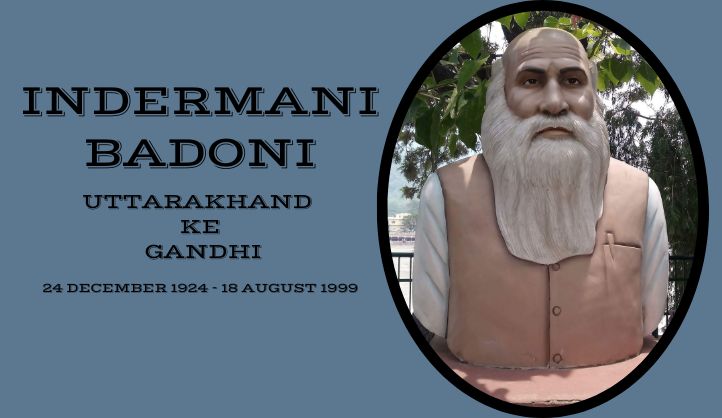Indramani Badoni, fondly known as the “Gandhi of Uttarakhand,” is a celebrated figure in the state of Uttarakhand, India. Revered for his role in championing the cause of statehood and advocating for the rights of its people, Badoni’s legacy is intertwined with the very soul of the Uttarakhandi movement. His principles of non-violence, self-sacrifice, and unwavering dedication to social justice earned him the title of “Gandhi of Uttarakhand.” This article delves into the life, ideology, and contributions of Indramani Badoni, a man whose spirit continues to inspire generations in the hills of Uttarakhand and beyond.
Early Life and Education
Indramani Badoni was born on December 24, 1924, in the small village of Akhori in the Tehri Garhwal district of Uttarakhand (then part of Uttar Pradesh). He grew up amidst the serene beauty of the Himalayas, which deeply influenced his love for nature and his commitment to the welfare of the people of the region.
Badoni’s early education was completed in his village, after which he moved to Dehradun and later to Allahabad for higher studies. His exposure to diverse cultures and ideas during his education years played a significant role in shaping his thoughts and ideologies. He was deeply influenced by Mahatma Gandhi’s principles of non-violence and civil disobedience, which later became the foundation of his own political and social work.
Political Awakening
Badoni’s political journey began in the 1950s when he actively participated in the freedom struggle against British colonial rule. Though India gained independence in 1947, the remote and hilly regions of Uttarakhand remained neglected and underdeveloped. This realization marked a turning point in Badoni’s life, propelling him to fight for the rights and recognition of his homeland.
He joined the Praja Socialist Party, which was known for advocating socialist principles and the rights of the common man. As a member of the party, Badoni traveled extensively across the Garhwal and Kumaon regions, listening to the grievances of the people, understanding their struggles, and advocating for their rights. His charismatic personality, combined with his ability to connect with the masses, quickly established him as a prominent leader in Uttarakhand.
The Demand for Statehood
The demand for a separate state for Uttarakhand can be traced back to the early 20th century, but it gained significant momentum in the 1970s and 1980s. Indramani Badoni emerged as a key figure in this movement, tirelessly working towards the realization of a separate state that would cater to the unique cultural, geographical, and socio-economic needs of the region.
Badoni’s demand for statehood was driven by several factors:
- Geographical and Cultural Distinctiveness: The hilly regions of Uttarakhand were distinctly different from the plains of Uttar Pradesh in terms of culture, language, and traditions. Badoni believed that the unique identity of Uttarakhand deserved recognition and governance tailored to its specific needs.
- Economic Neglect: The hilly regions were economically underdeveloped, with limited access to infrastructure, education, and healthcare. Badoni argued that a separate state would allow for better allocation of resources and more focused development.
- Political Marginalization: Uttarakhand’s representation in the Uttar Pradesh government was minimal, and its specific issues were often overlooked. Badoni believed that a separate state would empower the people of Uttarakhand politically, giving them greater control over their governance.
The Uttarakhand Movement
Indramani Badoni’s leadership in the Uttarakhand movement was marked by his commitment to non-violence and democratic principles. His approach was deeply inspired by Mahatma Gandhi’s philosophy of peaceful resistance. In the 1970s and 1980s, he organized numerous peaceful protests, marches, and rallies across the region to raise awareness about the demand for statehood. His eloquence, simplicity, and integrity earned him the trust and respect of the people.
1989 Srinagar Dharna: A Defining Moment
One of the most defining moments of the Uttarakhand movement under Badoni’s leadership was the historic sit-in protest, or “dharna,” at Srinagar in the Pauri Garhwal district in 1989. Despite being a senior leader, Badoni participated in the protest like an ordinary citizen, sitting on the streets with the people, enduring the harsh weather conditions and hunger.
This peaceful demonstration was a critical turning point in the movement, drawing national attention to the demand for a separate state. Badoni’s willingness to share in the hardships of his fellow protestors further solidified his position as the “Gandhi of Uttarakhand.”
Continued Efforts and Struggles
Throughout the 1990s, Badoni continued his efforts to mobilize support for the Uttarakhand cause. He traveled across villages, towns, and cities, urging people to unite for the cause of statehood. His speeches were marked by simplicity and clarity, appealing directly to the hearts of the people.
Badoni’s perseverance paid off when the demand for Uttarakhand began to gain traction at the national level. However, the movement was not without its challenges. It faced resistance from various quarters, including political opposition and instances of violence. Despite these obstacles, Badoni remained committed to his principle of non-violence, urging his followers to maintain peace and patience.
Indramani Badoni’s Ideology and Leadership Style
Indramani Badoni’s leadership was characterized by his adherence to non-violence, democratic values, and his deep-rooted commitment to the people of Uttarakhand. His approach to leadership was inclusive, participatory, and people-centric.
- Non-Violence and Peaceful Protest: Like Mahatma Gandhi, Badoni believed in the power of non-violent resistance. He was convinced that peaceful means were the most effective way to achieve justice and change. His insistence on non-violence kept the Uttarakhand movement largely peaceful, even during times of provocation.
- Grassroots Engagement: Badoni’s strength lies in his ability to engage with people at the grassroots level. He was often seen in the company of villagers, listening to their problems, and involving them in the decision-making process. This participatory style of leadership helped him build a strong base of support among the masses.
- Integrity and Simplicity: Known for his frugal lifestyle, Badoni led by example. He wore simple clothes, lived modestly, and was accessible to everyone, regardless of their social or economic status. This authenticity and humility earned him immense respect among his followers.
- Advocacy for Social Justice: Beyond the demand for statehood, Badoni was also a vocal advocate for social justice. He championed the rights of marginalized communities, including women, Dalits, and the poor. His vision for Uttarakhand was not just a separate state but a just and equitable society where every individual had the opportunity to prosper.
The Creation of Uttarakhand
Indramani Badoni’s relentless struggle, along with the efforts of many other activists, finally bore fruit on November 9, 2000, when the Indian government carved out Uttarakhand (initially named Uttaranchal) from Uttar Pradesh, making it the 27th state of India. Unfortunately, Badoni did not live to witness the creation of the state he had fought so hard for, as he passed away on August 18, 1999, just over a year before Uttarakhand was officially formed.
His death marked the end of an era, but his legacy lived on in the hearts of the people of Uttarakhand. The statehood movement and its eventual success are inextricably linked to Badoni’s vision, leadership, and sacrifices. He is remembered as the “Gandhi of Uttarakhand,” a title that reflects his commitment to peace, justice, and the welfare of the people.
Legacy and Impact
Indramani Badoni’s legacy is profound and enduring. He is revered as a pioneer of the Uttarakhand statehood movement and a symbol of the power of non-violent resistance. Several aspects of his legacy continue to influence the socio-political landscape of Uttarakhand today:
- Inspiration for Future Generations: Badoni’s life and work continue to inspire new generations of Uttarakhandis. His principles of non-violence, dedication to public service, and advocacy for justice remain relevant in the contemporary context, where many social and political issues still require attention.
- Promotion of Uttarakhand’s Unique Identity: Badoni’s efforts played a crucial role in highlighting the distinct cultural, social, and economic needs of Uttarakhand. His work helped establish a unique Uttarakhandi identity, which is now celebrated through various cultural events, literature, and public discourse.
- Tributes and Honors: Several institutions, roads, and public spaces in Uttarakhand are named after Indramani Badoni, recognizing his contributions to the state’s formation. Statues and memorials of Badoni stand in various parts of the state, serving as a reminder of his selfless dedication to the cause.
- Continued Relevance of His Principles: Badoni’s principles of grassroots engagement, non-violence, and social justice continue to influence the politics of Uttarakhand. Many political leaders and activists in the state draw inspiration from his methods and ideologies in their work.
Conclusion
Indramani Badoni was more than just a political leader; he was a visionary who dedicated his life to the service of his people. His unwavering commitment to the cause of Uttarakhand, his adherence to the principles of non-violence and social justice, and his ability to connect with the common people earned him a unique place in the hearts of the people of Uttarakhand. Badoni’s story is one of resilience, courage, and a profound love for his homeland. His journey from a small village in Tehri Garhwal to becoming the most prominent leader of the Uttarakhand movement showcases the impact a determined individual can have on society.
FAQs about Indramani Badoni
1. Who was Indramani Badoni and why is he called the “Gandhi of Uttarakhand”?
Indramani Badoni was a prominent social and political leader from Uttarakhand, known for his pivotal role in the Uttarakhand statehood movement. He is called the “Gandhi of Uttarakhand” due to his commitment to non-violent protest, social justice, and his dedication to the welfare of the people, much like Mahatma Gandhi.
2. What were the main contributions of Indramani Badoni to the Uttarakhand statehood movement?
Indramani Badoni led the Uttarakhand statehood movement by organizing peaceful protests, rallies, and sit-ins to demand a separate state for Uttarakhand. He was instrumental in uniting the people of Uttarakhand and advocating for their distinct cultural, social, and economic needs, which ultimately contributed to the formation of Uttarakhand as a separate state on November 9, 2000.
3. How did Indramani Badoni’s leadership style differ from other leaders in the Uttarakhand movement?
Badoni’s leadership style was characterized by his adherence to non-violence, grassroots engagement, simplicity, and integrity. Unlike other leaders, he focused on peaceful resistance and actively involved the common people in the decision-making process. His ability to connect with the masses and his dedication to the cause made him a respected and beloved leader.
4. What were some of the key events in Indramani Badoni’s life that highlighted his commitment to Uttarakhand’s cause?
One of the key events was the 1989 Srinagar Dharna, where Badoni led a historic sit-in protest that brought national attention to the demand for Uttarakhand’s statehood. He also traveled extensively across the region, organizing meetings, rallies, and protests to advocate for the rights of Uttarakhand’s people. His dedication to the cause was evident in his relentless efforts to promote non-violence and justice for all.
5. Did Indramani Badoni live to see the creation of Uttarakhand as a separate state?
No, Indramani Badoni passed away on August 18, 1999, a little over a year before Uttarakhand was officially formed as a separate state on November 9, 2000. Although he did not live to see the realization of his dream, his efforts and leadership played a crucial role in the state’s formation.
6. How is Indramani Badoni remembered today in Uttarakhand?
Indramani Badoni is remembered as a pioneer of the Uttarakhand statehood movement and a symbol of peace, justice, and unity. Several public spaces, roads, and institutions in Uttarakhand are named in his honor. Statues and memorials celebrate his contributions, and he is often invoked by contemporary leaders and activists as an inspirational figure who championed the cause of Uttarakhand’s identity and development.





